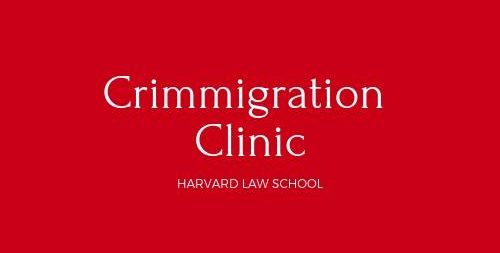via Harvard Immigration and Refugee Clinical Program

On December 31, 2019, the Crimmigration Clinic celebrated a victory on behalf of a client who had been detained for more than a year. Based on arguments submitted by the Clinic, the Board of Immigration Appeals (the Board) terminated removal proceedings against the client and released him from detention.
“In spite of the injustices our client has faced, I’m thrilled to know that he’ll soon be reunited with his family,” said Niku Jafarnia ’20. Jafarnia, and her case team partner, Joseph Tahbaz ’20, co-authored the appeals brief filed with the Board that resulted in the victory.
Like many immigrants, David* was denied justice in several ways. Although he had a strong case for possible immigration remedies, the Immigration Judge (IJ) denied him relief from removal largely due to a conviction for violating a Florida statute, which the IJ found triggered the “crime of child abuse” removal ground. The IJ’s decision was made in spite of the fact that David had lived in the United States for over 20 years as a green-card-holder, has two elderly U.S. citizen parents, and helps support his U.S. citizen teenage daughter. Additionally, the IJ failed to properly record the favorable testimony from David’s family at the hearing during which the IJ denied his request for relief. Without a transcript of that hearing, it was impossible for the Board to effectively review the IJ’s decision denying his relief. David knew the odds were stacked against him and he sought help.
The Crimmigration Clinic stepped in to represent David with his appeal to the Board. Jafarnia and Tahbaz worked diligently to craft an argument that had not yet been made in David’s case—David was not removable in the first place because his Florida conviction did not actually trigger the “crime of child abuse” ground of removal. Shortly after filing their brief, the Board’s decision was issued. The court agreed that the Florida statute covered criminal conduct that reached far beyond what the removal ground was designed to cover. The Board ultimately held that David’s conviction did not render him removable because the Florida statute criminalizes conduct that does not necessarily result in harm to a child, or even a significant risk of such harm. Without a viable ground of removal, the government terminated proceedings against him and released him from detention.
According to Tahbaz, the legal victory in David’s case is a reminder that even in these troubling times, there is hope that the law will be applied fairly and faithfully. “This case gives me great hope. I can’t wait to see what lies ahead in our client’s future.” said Tahbaz.
*Client’s name has been changed to respect his privacy.
Filed in: Clinical Spotlight, In the News
Contact Office of Clinical and Pro Bono Programs
Website:
hls.harvard.edu/clinics
Email:
clinical@law.harvard.edu